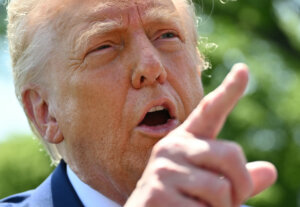Israelis observe damaged buildings after Iranian strike on June 14. Photo by Amir Levy/Getty Images
The Israel-Iran conflict is uniting the often-divided American Jewish community in a way the Gaza war has not.
While Israel’s actions against Hamas have sparked deep disagreements — especially over civilian casualties and concern about the fate of the hostages — the campaign against Iran is widely seen as a necessary act of defense that requires their solidarity and support.
What makes this moment different is that the entire Israeli security and political establishment, including the leaders of the opposition, are publicly backing the operation to eliminate Iran’s nuclear program and missile arsenal.
Where American Jews differ is on how involved the United States should be and what the ultimate outcome should look like.
The United States, with its arsenal of massive bombs and its vast air force, would compensate for some of Israel’s vulnerabilities.
President Donald Trump has so far held back from joining the fight. He has praised Israel’s upper hand and expressed hope it would lead to Iran returning to the negotiation table.
“Iran should have signed the ‘deal’ I told them to sign,” Trump said on Monday evening on the social media platform he owns, Truth Social. “What a shame, and waste of human life. Simply stated, IRAN CANNOT HAVE A NUCLEAR WEAPON. I said it over and over again! Everyone should immediately evacuate Tehran!”
Still, Trump’s calculus could shift dramatically if Iran directly targets the American military bases or personnel in the region.
These are the three ways American Jews are approaching the conflict with Iran:
Trump’s Jewish base

Jewish Republicans and the Orthodox community, who are traditionally more aligned with the Israeli right, are satisfied with how the Trump administration is handling the crisis.
“President Trump is obviously a divisive figure in the American Jewish community broadly,” said Nathan Diament, the Orthodox Union’s executive director for public policy. “But I think in our segment of the community, there’s appreciation that he’s standing by Israel.”
Diament noted Trump’s support for Israel’s actions to date, and his sharp criticism of isolationists, particularly his erstwhile ally, media personality Tucker Carlson. “At least for now, the isolationists have been sidelined,” is how Diament describes conversations he’s had.
Others who appreciate Trump would like to see him join Israel in finishing the job against an unprecedented threat posed by Iran.
“I want to see the President of the United States do what’s best for America, and what’s best for America is to make sure that the mullahs in Tehran never get a nuclear weapon,” said Dov Hikind, a former Democratic Assemblyman from New York who is close to some of the figures in Trump’s inner circle.
“The U.S. should definitely play a role in making it possible for Israel,” Hikind said. “There’s no turning back now.”
Israeli Prime Minister Benjamin Netanyahu, in interviews with U.S. media outlets, has praised Trump’s leadership and said he trusts his judgment on the matter. “President Trump will make the decisions that are best for America, and that’s the way it is,” Netanyahu said on Fox News on Sunday.
American Jews holding the center

Liberal Zionists, who have been vocal critics of the Israeli government and strongly oppose the current administration’s policy on the Israeli-Palestinian conflict, say that Israel’s strikes on Iran are self-defense. That sense is reinforced as Iranian ballistic missiles continue to rain down on Israeli cities and directly target innocent civilians.
Rabbi Rick Jacobs, the president of the Union for Reform Judaism, the largest Jewish denomination in the U.S., said in an interview one need not be a strong supporter of this current Israeli government, or of Netanyahu, “to feel that this strike against Iran makes Israel, the Jewish people and the world safer.”
Jacobs said the Jews he converses with believe Israel should complete the mission without direct U.S. involvement. The sense he gets is this is the moment for American Jews to “stand strong” in solidarity with Israel despite disagreements on other issues.
“I think everybody should realize that whatever attempts were made, they were not containing Iran’s nuclear program,” he said. “And the threat of Iran being able to even assemble one nuclear bomb, if people don’t think that’s an existential threat to Israel, then they’re not paying attention.”
Rabbi David Wolpe, the emeritus rabbi of Sinai Temple in Los Angeles, said that American Jews hope that the United States will provide Israel the support it needs to inflict “the maximum damage to Iran’s nuclear program and as speedily as possible.”
“I think there is a much greater consensus about this, certainly about anything else since Oct. 7,” 2023, when Hamas launched its war against Israel, said Wolpe, who belongs to the Conservative movement. “I think this is unambiguously good for the world. There’s no doubt about it.”
Jewish Democrats and progressives
Jewish Democrats and progressive groups aligned with the party are divided on the extent of U.S. involvement in the conflict. But there is broad agreement on the need for a diplomatic resolution that ensures Iran never reaches the threshold of developing a nuclear weapon.
Halie Soifer, the chief executive of the Jewish Democratic Council of America, said in an interview that the mixed signals Trump has been sending about the degree to which he supports the operation are hurting Israel.
“At this juncture, it’s critical that there be clear American leadership,” she said. “This administration has to make its position clear and ensure that Israel has everything it needs to defend itself from ongoing Iranian attacks.”
She contrasted the Trump administration distancing itself from Israel on Thursday night, when Israel first launched its attacks, and what she said were his vague statements about ensuring Israel’s defense, with the Biden administration’s deployment of U.S. military resources and troops on the two occasions Iran launched missiles at Israel last year.
J Street, the pro-Israel, pro-peace advocacy group, said that while there is deep concern for the people of Israel under attack, the Trump administration must intervene to end the “cycle of retaliation and escalation” by both sides. Trump, hugely popular in Israel, is uniquely posed to deescalate the conflict, he said.
“The most important thing that needs to happen now is to deescalate,” Jeremy Ben-Ami, the organization’s president, said in an interview. “The worst outcome would be a broader array of targets being hit, drawing the U.S. in and expanding this into a regional or even multinational conflict.”
Ben-Ami and Soifer, who previously served as national security adviser to then-Senator Kamala Harris, both said they would support efforts to resume direct talks between the U.S. and Iran to finalize an agreement.
“The only way out is right back where we started, which is that there has to be a diplomatic agreement,” Ben-Ami said.

